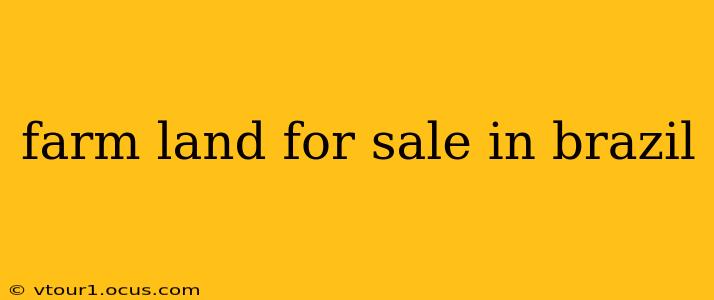Brazil, a vast and diverse country, presents significant opportunities for agricultural investment. With its fertile lands, favorable climate in many regions, and growing global demand for agricultural products, purchasing farmland in Brazil can be a lucrative venture. However, navigating the Brazilian land market requires careful planning and understanding of the legal and logistical intricacies. This guide will explore the key aspects of buying farmland in Brazil, answering frequently asked questions and providing valuable insights for potential investors.
What are the best regions in Brazil for farmland investment?
The ideal region for farmland investment in Brazil depends heavily on the intended agricultural use. Several areas stand out:
-
Matopiba (Maranhão, Tocantins, Piauí, and Bahia): This region, known for its vast expanses of fertile Cerrado savanna, is rapidly developing as a major agricultural hub, particularly for soybeans and grains. The lower land prices compared to more established areas make it attractive, but infrastructure development is still ongoing.
-
Mato Grosso: A longstanding agricultural powerhouse, Mato Grosso boasts highly productive lands ideal for soybeans, corn, and cattle ranching. However, land prices are generally higher here due to established infrastructure and productivity.
-
Southern Brazil (Paraná, Santa Catarina, Rio Grande do Sul): This region offers a more temperate climate, suitable for a wider range of crops, including wheat, coffee, and fruit. It also benefits from well-established infrastructure and logistics. Land prices tend to be higher in this region.
-
Amazon Rainforest (with caveats): While environmentally sensitive, some areas bordering the Amazon may have suitable land for agriculture, but purchasing land in this region requires meticulous due diligence regarding environmental regulations and sustainable practices. This should only be pursued by investors with a deep understanding of these complex issues.
What are the typical costs associated with buying farmland in Brazil?
The cost of farmland in Brazil varies significantly depending on location, soil quality, infrastructure access, and the size of the property. Factors such as the presence of existing improvements (buildings, irrigation systems) also influence the price. Generally, land prices are lower in less developed regions and higher in established agricultural areas with good infrastructure. Expect to pay additional costs for legal fees, land surveying, environmental assessments, and potential property taxes. It is crucial to engage experienced legal and financial professionals throughout the process.
What are the legal requirements for buying farmland in Brazil?
Navigating the legal aspects of purchasing farmland in Brazil is essential. The process involves several steps:
- Due Diligence: Thorough investigation of the property's title, ensuring it is free of encumbrances or disputes.
- Legal Representation: Engaging a reputable Brazilian lawyer specializing in real estate is crucial for navigating legal complexities and ensuring a smooth transaction.
- Registration: Formal registration of the property transfer with the relevant land registry office is necessary to secure ownership.
- Environmental Compliance: Depending on the location and intended use of the land, environmental permits and assessments might be required.
What are the risks associated with buying farmland in Brazil?
Like any investment, purchasing farmland in Brazil involves risks:
- Land Disputes: Unresolved land title issues can lead to legal battles and potential loss of investment.
- Environmental Regulations: Stricter environmental regulations could impact agricultural practices and profitability.
- Currency Fluctuations: Changes in the Brazilian Real's exchange rate can affect the overall return on investment.
- Infrastructure Challenges: Lack of adequate infrastructure in some regions can increase operational costs.
What is the process for obtaining financing for farmland purchases in Brazil?
Securing financing for farmland purchases in Brazil often involves working with Brazilian banks or specialized agricultural lenders. The availability of financing depends on several factors, including credit history, the property's value, and the borrower's financial capacity. A strong business plan demonstrating the viability of the agricultural project is critical in obtaining financing.
How can I find a reliable real estate agent specializing in farmland sales in Brazil?
Networking with other agricultural investors or seeking recommendations from Brazilian agricultural organizations can help you identify reliable real estate agents specializing in farmland sales. Thorough due diligence on the agent's reputation and experience is paramount. Ensure the agent has a proven track record of successful transactions in the targeted region.
Investing in Brazilian farmland presents significant opportunities, but careful planning, thorough due diligence, and professional guidance are essential for success. This information serves as a starting point; it's crucial to seek professional advice tailored to your specific circumstances and investment goals.
